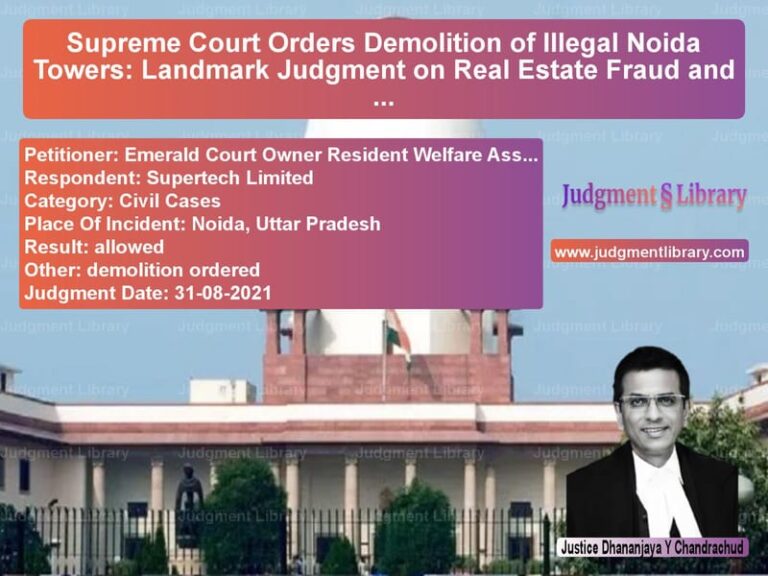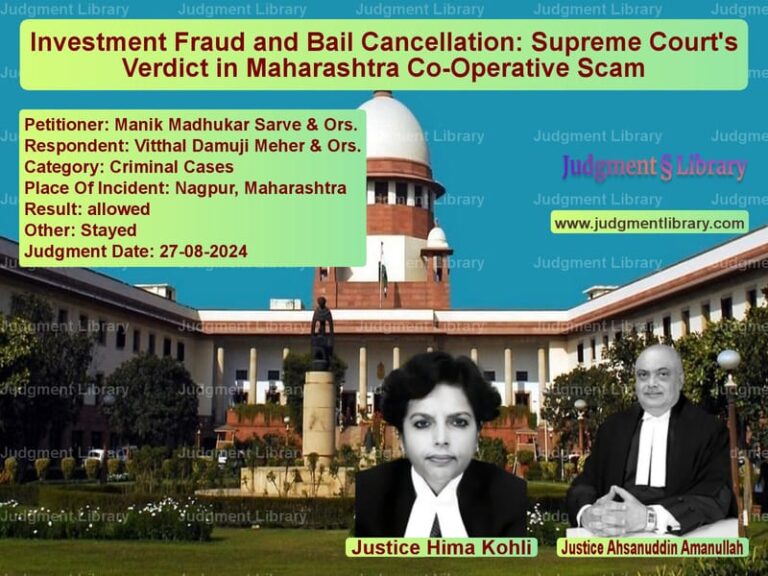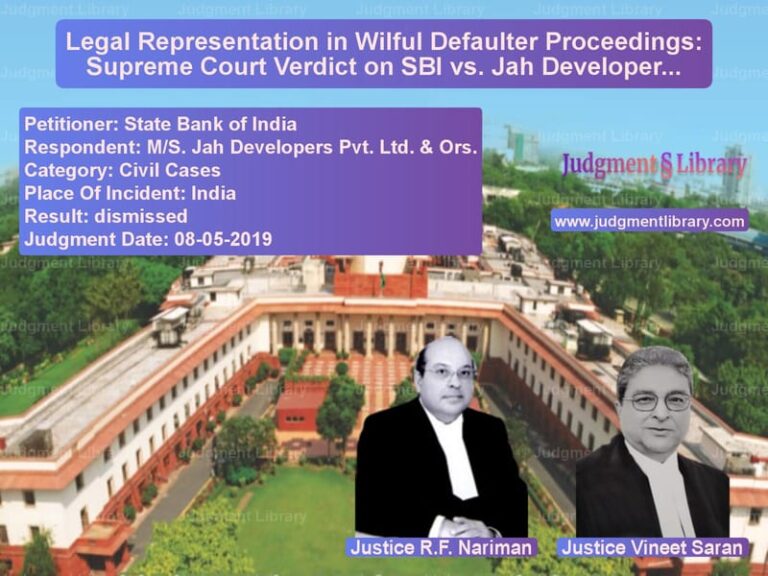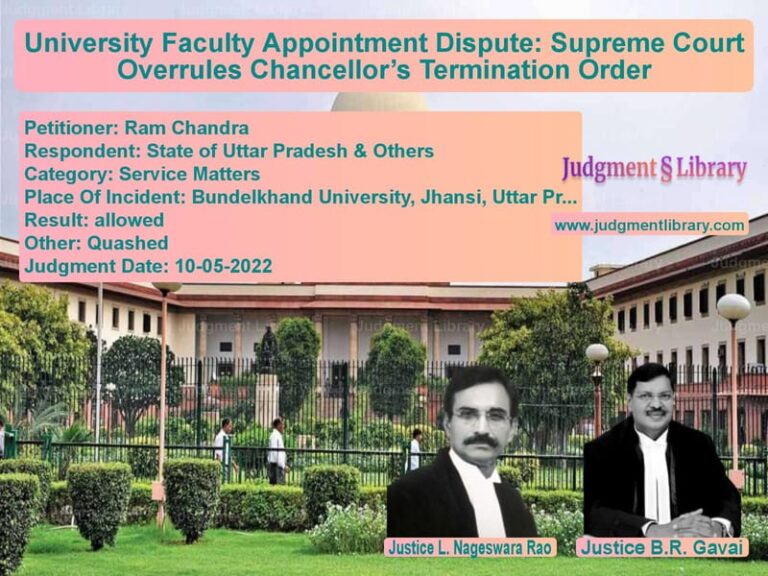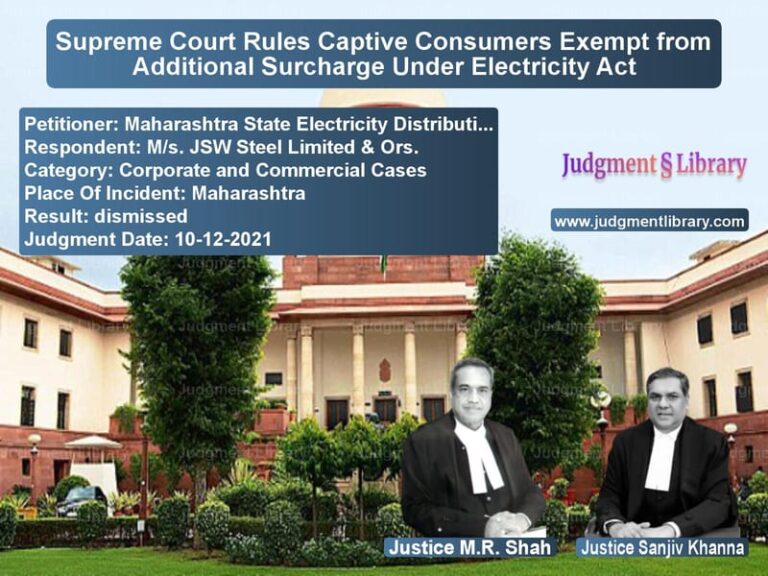Child Custody Dispute: Supreme Court Grants Father Custody After Mother’s Death
The case of Vivek Kumar Chaturvedi & Anr. vs. State of U.P. & Ors. revolves around a child custody dispute following the demise of the mother. The Supreme Court of India, in its ruling, granted custody of the minor child to the father while setting visitation rights for the maternal grandparents.
The dispute arose after the death of the child’s mother in 2021. The minor was residing with his maternal grandparents, and the father, who had remarried, sought custody. The High Court had denied custody to the father, citing the child’s comfort with the grandparents and the remarriage of the father. The Supreme Court, however, overturned this decision, ruling that the father, as the natural guardian, had the rightful claim to custody.
Background of the Case
The father of the minor child filed a Habeas Corpus Writ Petition in the High Court seeking custody. However, the High Court dismissed the petition, stating that:
- The child was comfortable living with his maternal grandparents.
- The father had remarried soon after the death of his wife.
- The child’s welfare would be best served by continuing his residence with his grandparents.
Aggrieved by this order, the father approached the Supreme Court.
Arguments Before the Supreme Court
Petitioner’s (Father’s) Arguments
The father’s counsel, Mr. Gopal Jha, contended that:
- The father is the natural guardian under the law and should have custody.
- The ruling in Gautam Kumar Das vs. NCT of Delhi established that after the death of the mother, the child should be in the custody of the surviving parent.
- The father had taken steps to secure the child’s future, including:
- His own father (paternal grandfather) had conveyed a property in the child’s name.
- Rs. 10 lakh was deposited in the child’s name.
- A life insurance policy worth Rs. 25 lakh was taken out for the child’s benefit.
- The father, a State Administrative Services officer, could provide financial and emotional stability.
- His second wife had given an affidavit stating she was willing to care for the child.
Respondent’s (Maternal Grandparents’) Arguments
The grandparents’ counsel, Mr. Rajeev Kumar Dubey, argued:
- The father’s remarriage soon after his wife’s death suggested he was not emotionally attached to the child.
- The child had adapted to life with his grandparents and was happy there.
- The father had already filed a petition under the Guardian and Wards Act, 1890, making the Habeas Corpus petition unnecessary.
- Following the ruling in Nirmala vs. Kulwant Singh, a detailed inquiry into the child’s welfare was necessary, which the Guardian Court could conduct.
Supreme Court’s Observations
The Supreme Court analyzed the applicability of a Habeas Corpus petition in child custody matters. It cited:
- Tejaswini Gaud vs. Shekhar Jagdish Prasad Tewari: Habeas Corpus is maintainable when the custody of the child is illegal.
- Gautam Kumar Das vs. NCT of Delhi: A father has a stronger legal right over the custody of his child than maternal relatives.
The Court noted:
“Ordinarily in child custody matters, a Writ of Habeas Corpus is maintainable only when it is proved that the detention of the minor child by a parent or otherwise was illegal or without any authority of law.”
The Court observed that:
- The child had been in the father’s custody for ten years before the mother’s death.
- The maternal grandparents had filed a maintenance case against the father seeking Rs. 20,000 per month for the child, indicating financial strain.
- The father had made significant financial provisions for the child.
- The grandparents could not offer a better claim than the natural guardian.
Final Judgment
The Supreme Court ruled:
“The father, the natural guardian, is well-employed and educated. There is nothing standing against his legal right and legitimate desire to have custody of his child. The welfare of the child, in the facts and circumstances of this case, would be best served if custody is given to the father.”
However, the Court considered the child’s current schooling and familiarity with the grandparents. It ruled that:
- The child will remain with the grandparents until April 30, 2025, allowing him to complete the academic year.
- The father will have weekend custody on alternate weekends.
- On May 1, 2025, custody will be fully transferred to the father.
- Post-transfer, the grandparents will have visitation rights on weekends containing the second Saturday of each month.
- The ongoing Guardian and Wards case will be closed.
Key Takeaways
This judgment sets important precedents:
- Natural Guardianship: Fathers have a stronger claim over custody unless there is proven neglect or abuse.
- Financial Stability: The ability to provide for the child plays a crucial role in custody decisions.
- Best Interests of the Child: Courts consider emotional attachment, familiarity, and stability while making custody decisions.
- Gradual Custody Transfer: When a child has been separated from a parent for a significant time, courts may order a transition period.
Conclusion
The Supreme Court’s decision ensures that the child remains with his natural guardian while allowing for a smooth transition. The ruling balances the welfare of the child, the rights of the father, and the emotional bond with the grandparents. It underscores the importance of securing a child’s future while maintaining family ties.
Petitioner Name: Vivek Kumar Chaturvedi & Anr..Respondent Name: State of U.P. & Ors..Judgment By: Justice B.R. Gavai, Justice K. Vinod Chandran.Place Of Incident: Uttar Pradesh.Judgment Date: 06-02-2025.
Don’t miss out on the full details! Download the complete judgment in PDF format below and gain valuable insights instantly!
Download Judgment: vivek-kumar-chaturve-vs-state-of-u.p.-&-ors.-supreme-court-of-india-judgment-dated-06-02-2025.pdf
Directly Download Judgment: Directly download this Judgment
See all petitions in Succession and Wills
See all petitions in Legal Malpractice
See all petitions in Public Interest Litigation
See all petitions in Judgment by B R Gavai
See all petitions in Judgment by K. Vinod Chandran
See all petitions in allowed
See all petitions in Quashed
See all petitions in supreme court of India judgments February 2025
See all petitions in 2025 judgments
See all posts in Civil Cases Category
See all allowed petitions in Civil Cases Category
See all Dismissed petitions in Civil Cases Category
See all partially allowed petitions in Civil Cases Category



